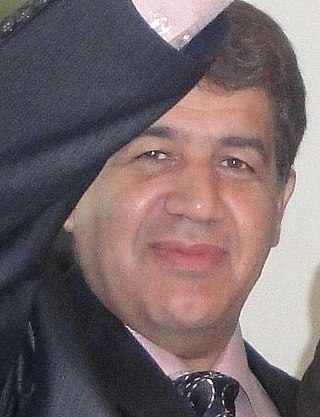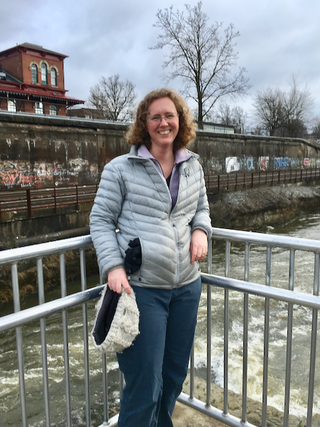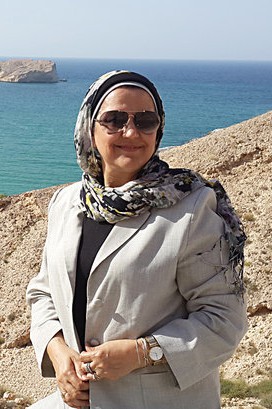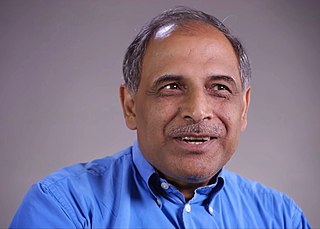Related Research Articles

Hydrology is the scientific study of the movement, distribution, and management of water on Earth and other planets, including the water cycle, water resources, and drainage basin sustainability. A practitioner of hydrology is called a hydrologist. Hydrologists are scientists studying earth or environmental science, civil or environmental engineering, and physical geography. Using various analytical methods and scientific techniques, they collect and analyze data to help solve water related problems such as environmental preservation, natural disasters, and water management.

Rafael Luis Bras is a Puerto Rican civil engineer best known for his contributions in surface hydrology and hydrometeorology, including his work in soil-vegetation-atmosphere system modeling.
The following outline is provided as an overview of and topical guide to hydrology:

Saeid Eslamian is a full professor of hydrology and water resources sustainability at Isfahan University of Technology in the Department of Water Engineering. His research focuses mainly on statistical and environmental hydrology and climate change. In particular, he is working on forecasting natural hazards including flood, drought, storm, wind, pollution toward a sustainable environment. He is now the Director of Excellence in risk management and natural hazards. Formerly, he was a visiting professor at Princeton University, United States, university of ETH Zurich, Switzerland and McGill University, Montreal, Quebec, Canada. He has contributed to more than 600 publications in journals, books, or as technical reports. He is the founder and chief editor of International Journal of Hydrology Science and Technology. Currently, he has been the author of about 210 books and book chapters. Eslamian is the editorial board member and reviewer of about 100 Web of Science (ISI) Journals. Saeid is the editor of Journal of Hydrology (Elsevier)Journal of Hydrology, Ecohydrology and Hydrobiology (Elsevier), Journal of the Saudi Society of Agricultural Sciences (Elsevier), Journal of Water Reuse and Desalination (IWA).

Diane McKnight is a professor of civil, environmental, and architectural engineering at the University of Colorado Boulder and a fellow at the Institute of Arctic and Alpine Research (INSTAAR). McKnight is a founding principal investigator of the National Science Foundation's Long-Term Ecological Research (LTER) program in the McMurdo Dry Valleys of Antarctica.
Ana Paula Barros is an African-born American civil and environmental engineer currently the Donald Biggar Willett Chair of Engineering and Department Head of Civil and Environmental Engineering at the University of Illinois at Urbana-Champaign and an Elected Fellow of the American Association for the Advancement of Science and an Elected Fellow of the American Meteorological Society. In 2019 she was elected to the National Academy of Engineering for "contributions to understanding and prediction of precipitation dynamics and flood hazards in mountainous terrains". Prior to joining the University of Illinois, Professor Barros was the James L. Meriam Professor of Civil and Environmental Engineering at Duke University.
Jean Marie Bahr is a hydrogeologist who examines how the physical and chemical composition of groundwater and how that controls the mass transportation of groundwater. She currently is an Emeritus Professor at the University of Wisconsin Madison in the department of geosciences.

Anne Jarvis Jefferson is an American hydrologist who specializes in watershed hydrology, urban hydrology, and hydroecology. As of 2023, she is the Patrick Chair in Watershed Science and Planning at the Rubenstein School of Environment and Natural Resources at the University of Vermont. Previously she was an associate professor at Kent State University in the Department of Geology, which became the Department of Earth Sciences.
Petra Döll is a German hydrologist whose work focuses on modeling global water resources. She is a professor of hydrology and researcher at the Institute of Physical Geography, Goethe University Frankfurt.

Kamini Singha is a Professor in the department of Geology and Geological Engineering at the Colorado School of Mines, where she works on questions related to hydrogeology.
Newsha K. Ajami is a hydrologist specializing in urban water policy and sustainable water resource management. Though trained as a scientist and engineer, her work is interdisciplinary in nature and combines science with its social counterparts. She is currently a senior scholar at Stanford University and manages the university's Urban Water program.
Alexandria Boehm is an American scientist whose field of study is civil and environmental engineering. She studies sources, fate and transport of pathogens outside the human body, and coastal water quality. Boehm is a senior fellow at Stanford University's Woods Institute for the Environment and an associate professor in Stanford University's Department of Civil and Environmental Engineering.

Souad Naji Al-Azzawi is an Iraqi environmentalist & academic researcher in various engineering disciplines, in addition to having established and assisted in the establishment of multiple research & academic institutions in Iraq. She is the first Arab to receive the Nuclear-Free Future Award, with has more than 50 published scientific papers on topics ranging from water desalination, nuclear waste management, and Depleted Uranium contamination among others and is a distinguished member of the Iraqi scientific community.

Georgia "Gia" Destouni is a Professor of Hydrology at Stockholm University. She works on the Baltic Sea Region Programme as well as studying the impact of climate change on societies in Northern Europe. She is the chair of the Global Wetland Ecohydrology Network (GWEN) and was involved with the National Geosphere Laboratory.
Kimberly A. Novick is an environmental scientist and an Associate professor at Indiana University, Bloomington. Her research mostly includes the study of land-atmosphere interactions. She received the Thomas Hilker Early Career Award in Biogeosciences from American Geophysical Union (AGU) in 2019.
Efi Foufoula-Georgiou is a Distinguished Professor in the Civil and Environmental Engineering department at the University of California, Irvine. She is well known for her research on the applications of wavelet analysis in the fields of hydrology and geophysics and her many contributions to academic journals and national committees.

Hrund Ólöf Andradóttir is the first woman to hold the position of professor in Civil and Environmental Engineering in Iceland.

Marc Brendan Parlange is an American academic, recognised for his research expertise in environmental fluid mechanics and research in hydrology and climate change. His contributions primarily relate to the measurement and simulation of air movement over complex terrain, with a focus on how atmospheric turbulence dynamics influence urban, agricultural and alpine environments and wind energy. He has also been active in addressing water resources challenges and environmental change in remote communities, particularly West Africa.

Laura J. Crossey is an American hydrologist and geochemist and Distinguished Professor of Earth and Planetary Sciences at the University of New Mexico (UNM). Crossey is part of UNM's Sustainable Water Resources Grand Challenge team, which studies water and climate in New Mexico and other arid regions. She has studied springs and groundwater in areas including the Western Desert of Egypt, Australia's Great Artesian Basin, Tibet, the Middle Rio Grande Basin and the Grand Canyon.

Upmanu Lall is an Indian-American engineer and the Alan and Carol Silberstein Professor of Engineering at Columbia University. He serves as Director of the Columbia Water Center. Lall studies water scarcity and how to predict and mitigate floods. He was named an American Geophysical Union Fellow in 2017 and their Walter Langbein Lecturer in 2022. He was elected a fellow of the American Association for the Advancement of Science in 2018, and has received the Arid Lands Hydrology and the Ven Te Chow Awards from the American Society of Civil Engineers. In April 2021 he was named to the “Hot List of the world’s 1,000 top climate scientists” by Reuters.
References
- 1 2 3 "Terri S. Hogue". Colorado School of Mines. Retrieved 2019-05-05.
- ↑ "Terri Hogue". Institute of Environmental Sustainability at UCLA. 2016-09-22. Retrieved 2019-05-05.
- ↑ "Terri S. Hogue". American Geophysical Union - Leadership. Retrieved 2019-05-05.
- ↑ Hogue, Terri. "Terri S. Hogue, Ph.D Curriculum Vitae" (PDF). Colorado School of Mines. Retrieved 2019-05-05.
- 1 2 "Civil and Environmental Engineering names new head | Colorado School of Mines | Newsroom". www.minesnewsroom.com. Retrieved 2019-05-05.
- 1 2 "Three appointments, one reappointment announced for Board of Trustees | Colorado School of Mines | Newsroom". www.minesnewsroom.com. Retrieved 2019-05-07.
- ↑ "Battalora named faculty rep to Mines Board of Trustees | Colorado School of Mines | Newsroom". www.minesnewsroom.com. Retrieved 2019-05-07.
- 1 2 "Hogue Research Group". inside.mines.edu. Retrieved 2019-05-07.
- ↑ Hogue, Terri S.; Sorooshian, Soroosh; Gupta, Hoshin; Holz, Andrea; Braatz, Dean (2000-12-01). "A Multistep Automatic Calibration Scheme for River Forecasting Models". Journal of Hydrometeorology. 1 (6): 524–542. Bibcode:2000JHyMe...1..524H. doi: 10.1175/1525-7541(2000)001<0524:AMACSF>2.0.CO;2 . ISSN 1525-755X.
- ↑ "EPA awards $1.9 million to Colorado School of Mines for water infrastructure research | Colorado School of Mines | Newsroom". www.minesnewsroom.com. Retrieved 2019-05-07.
- ↑ "Mines researchers awarded NSF Water Sustainability and Climate grant to study urban eco-hydrology and water sustainability | Colorado School of Mines | Newsroom". www.minesnewsroom.com. Retrieved 2019-05-07.
- ↑ "Mines researchers awarded NSF grant to study fire impacts on water quality near Yosemite | Colorado School of Mines | Newsroom". www.minesnewsroom.com. Retrieved 2019-05-07.
- ↑ "Hogue contributes to Los Angeles River watershed study | Colorado School of Mines | Newsroom". www.minesnewsroom.com. Retrieved 2019-05-07.
- ↑ "NSF Award Search: Award#0846662 - CAREER: Investigation of Regional Land-Atmosphere Interactions in Semi-arid Cities Using the WRF-Noah-Urban Canopy Model". www.nsf.gov. Retrieved 2019-05-07.
- ↑ "Hazards Researchers to Take Capitol Hill". www.nsf.gov. Retrieved 2019-05-10.
- ↑ "Terri S. Hogue". Leadership. Retrieved 2019-05-07.
- ↑ "NSF funds K-12 teacher water-energy research project | Colorado School of Mines | Newsroom". www.minesnewsroom.com. Retrieved 2019-05-07.